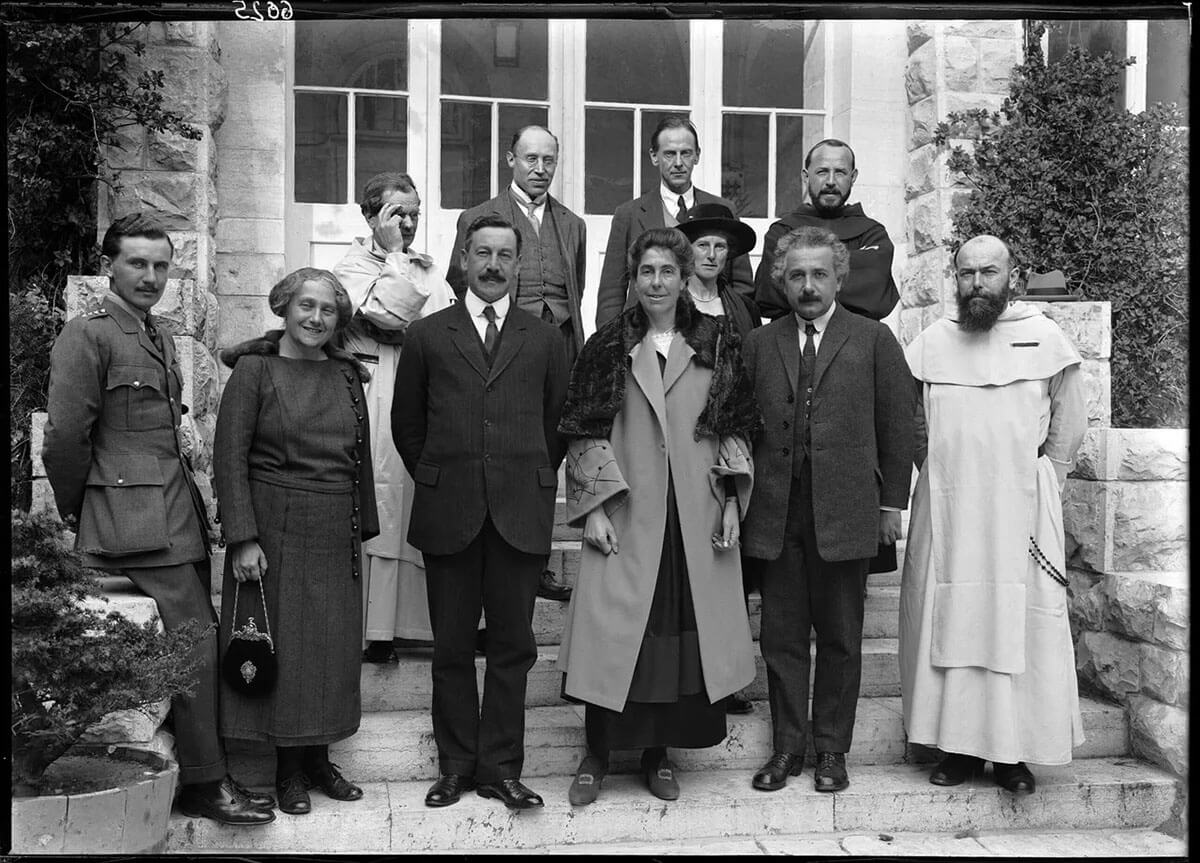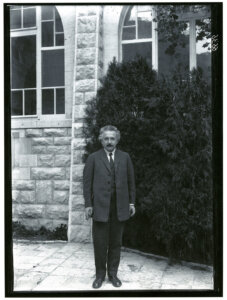100 years ago, Albert Einstein took his one and only trip to the holy land. This is what happened.
The Nobel Prize-winning physicist would help establish the Hebrew University in Jerusalem, now home to his archives

Graphic by Angelie Zaslavsky
This article originally appeared on Haaretz, and was reprinted here with permission. Sign up here to get Haaretz’s free Daily Brief newsletter delivered to your inbox.
Rainy, gloomy weather greeted Albert Einstein on his only trip to the Holy Land 100 years ago, in early February 1923. “Arab villages, Jewish colonies, olive trees, cacti, and orange trees” were the first sights to catch his eye, as he noted in his journal, in German.
There was great excitement among the Jewish population regarding his 12-day trip, Haaretz reported: “An important and encouraging event took place today, amid the mundanity of our lives. Today the titan of this generation, in Israel and among the nations, came to the Land of Israel – none other than Albert Einstein, the father of the theory of relativity. What Newton was to the past three centuries, Einstein shall be to future generations.”
Accompanied by his wife Elsa, as part of a five-and-a-half-month journey to the Far East and Middle East, Einstein stopped in Tel Aviv, Rishon Letzion, Jerusalem, Jericho, Haifa, Nahalal, Tiberias, Nazareth, and other sites throughout the country during his 12-day trip.
“Now Einstein has arrived to see the country being built, to see its builders in their travails and joy of creation, to see in order to do, to take part in our building,” Haaretz waxed poetic. “Let the holy spirit of the Land of Israel and the resurrection of Israel welcome the titan of the generation as he comes to us.”
Einstein may have admired some of the landscapes and people he encountered in Mandatory Palestine, but his diary also includes comments about sights that sparked negative impressions, such as in the “very dirty” Jerusalem: “Visit to the Bukharian Jewish quarter and to dark synagogue where pious, grimy Jews await the end of the Sabbath in prayer,” he wrote, going on to describe worshipers at the Western Wall, “with their faces turned to the wall, bending their bodies to and fro in a swaying motion. Pitiful sight of people with a past but without a present” (“The Collected Papers of Albert Einstein: Vol. 13,” Princeton University Press).
When he visited Nahalal, a moshav in the north, he “expressed great bewilderment at the fact which he found most odd, that the people of Nahalal care far more for the farm animals than for their own souls and those of their families,” according to Haaretz.
On the other hand, when encountering local people during his trip, he would offer the requisite praise. “I am greatly astonished to see the immense work done by you. I see here a fresh creative force working in difficult conditions, with devotion and sacrifice,” he said at one such meeting. “The achievements of the Jews in just a few years arouse the highest admiration,” he told residents of Tel Aviv. “A contemporary Hebrew city with busy economic and intellectual life shoots up from the bare ground. What an incredibly active people our Jews are!” he noted in his diary.
Greeting students at Tel Aviv’s prestigious Herzliya Hebrew Gymnasium, he said: “Dear children, for the first time in my life I see so many Hebrew children, displaying such lovely gymnastics, with power and strength and harmony. I express my deepest thanks to you for the pleasure you have given me.”
The Gymnasium’s principal, Ben Zion Mossinson, told his pupils that Einstein “came as a Zionist to see the country, to observe what is happening in it, in the hopes that he may later put down roots here.” To the students, who wondered why the honored guest was not speaking to them in Hebrew, the principal explained: “He has asked me to inform you that he is most regretful that he is as yet incapable of addressing you in Hebrew.” However, Mossinson added – hopeful for a future that never came to pass – “He is studying Hebrew and hopes one day to teach you in Hebrew at the Jerusalemite University.”
Einstein, for his part, did not intend to learn Hebrew, nor did he consider making aliyah. He contented himself with receiving the honorary citizenship of the first Hebrew city. “While I have become a citizen of New York City, I am 10 times happier to be a citizen of the fair Hebrew city,” he declared.
‘Unproductive work’

When he toured Haifa, his hosts also tried to sell him on taking up residence in their midst. Arthur Biram, principal of the Hebrew Reali School addressed him in German, “demanding that he remain here among our children, for among them he would find happiness,” according to a report in the newspaper Doar Hayom.
However, in private conversations, the great scientist made it clear that he had no intention of doing so, “because in Europe he feels free and here he would always be a prisoner. He has no intention of being a mere ornament in Jerusalem.” That comment was quoted in the diary of soldier and Zionist leader Friedrich Kisch (grandfather of current Education Minister Yoav Kisch), who accompanied Einstein on his tour.
“I am absolutely wanted in Jerusalem and am being assailed on all fronts in this regard [i.e., settling in the country]. My heart says yes but my reason says no,” Einstein wrote in his diary. For his part, Kisch added that Einstein spoke of “the nature of his mind,” and expressed concern that “learning Hebrew would be unproductive work for him.”
The high point of the visit was Mt. Scopus, where the Hebrew University of Jerusalem was being built and would open some two years later. Menachem Ussishkin, a senior Zionist leader, gave an impassioned speech there: “Across from this spot you see Mount Moriah. Thousands of years ago, one of the great men of our people, King Solomon, built a house of prayer there to the gods of the world, and when he consecrated the house, he prayed that it would be a house of prayer for all peoples.
“And we pray now that this building, the Hebrew University building being consecrated on Mt. Scopus, shall be a house of science for all nations. From the moment you take the stage, this stage shall be our pride and sanctity. Our great brother, take the stage, which has been awaiting you for 2,000 years.”
Einstein began his lecture in Hebrew. “I too am overjoyed to be giving my lecture in the country that has spread Torah and light to the entire enlightened world, and in a house that is being prepared to be a center of wisdom and science for all peoples of the East. I regret to say that I am incapable of reading my lecture in the tongue of my people, and am therefore compelled to switch to a language understood by all of you,” he said.
Thus he prefaced his speech, to spare the crowd the embarrassment of possibly not comprehending it, with the words, “I shall speak in French, a language I am not as fluent in, and should the audience not understand my scientific lecture on the theory of relativity, let the listeners imagine that they have failed to understand me solely due to my linguistic struggles.”
Later on it was revealed that not only the general audience, but many of the dignitaries present struggled to understand the renowned physicist. “I went to Jerusalem to hear the visitor’s lecture. From his entire lecture I understood one thing – that the entire audience understood nothing of it,” Tel Aviv Mayor Meir Dizengoff reported. Later on, when Einstein gave his speech in Tel Aviv as well, he opened by promising, “Fear not, gentlemen, it won’t take long.”
Haaretz’s reporter, too, was forced to admit that he failed to understand the theory of relativity: “There is no way to report the content of the lecture or highlights thereof in this newspaper. Despite the speaker’s attempts to elucidate his words with illustrations and diagrams, and despite the rapt attention of the listeners, there were surely very few who could grasp the principles of the wondrous theory. It struggled to find purchase in the hearts,” according to one article.
“It was impossible to translate his speech. It is a difficult thing. Had they sat for weeks on end, they couldn’t render it,” principal Mossinson added.
When touring a new locale being built outside Jerusalem, Einstein was impressed that the Jewish laborers “arrive with no special knowledge or expertise, and soon achieve excellence,” approvingly noting in his diary that the site managers earned the same wages as the common laborers.
At the national repository of books in Jerusalem, which was located at the time in the Abyssinian quarter downtown and later became the National Library, readers in the athenaeum stood up when greeting Einstein. Employees presented him with a collection of mathematical books from the dawn of Hebrew print. At the city’s Bezalel Art Academy he was struck by “the revival of the ancient Jewish ornaments.”
Grimy but tenacious
During his trip to the northern part of the country, Einstein noted that the landscape surrounding Lake Kinneret “resembles Lake Geneva.” He described Tiberias as “picturesque,” using the same adjective for Nazareth. En route from Nazareth to the community of Migdal, his car got stuck in the mud and had to be extracted with mules.
During his brief travels in the area, he was also impressed by a “young, pretty-as-a-picture Jewess and an interesting educated worker in the farmhouse.” The pioneers he met touched his heart: “Grimy but of earnest will and with tenacity and love in pursuit of their ideal, carrying on the fight against malaria, hunger, and debt.” He correctly forecast that “this communism will not last forever,” but expressed the certainty that it “will raise people of integrity.” In one of his few encounters with Arabs, he got the impression that “the common folk know no nationalism.”
Einstein came across as humble, during his visit to Palestine, and explained his genius as follows at one point: “There are special cells in the human brain, and when the cells happen to come together in a special way, they create this sort of ideas which have to come. These cells happened to come together in my brain, and I am happy that these cells came together in my brain, a Jewish brain, not for the goyim to say, but to encourage and empower ourselves.”
To this, Mossinson, of the Hebrew Gymnasium, added: “We know well that cells don’t just happen to come together,” adding that Einstein had “suckled from our people,” and “derived his theory… from the sparks scattered among us.”
During the great scientist’s visit to the Reali School and the Technion Institute of Technology in Haifa, Einstein said that in addition to having a developed mind, the hands of a Jew must also be trained. He told one audience that while aboard ship, en route to Palestine, his pipe had broken and he had to give it to a Swiss mechanic to be fixed.
“With us Jews, everything has been concentrated in the brain, and nothing was left in the hands,” he deduced. “Here, at the Technion, I see the desire to develop the hands,” he concluded before planting a tree, which stands there to this day.















